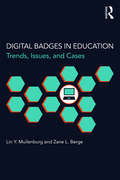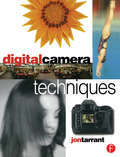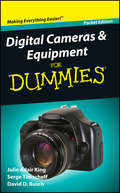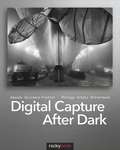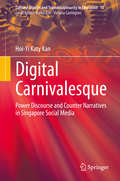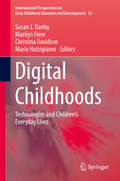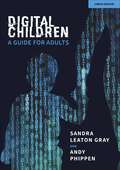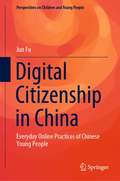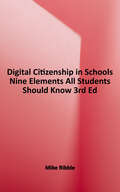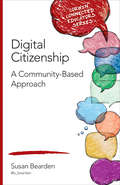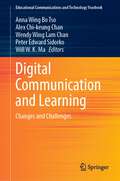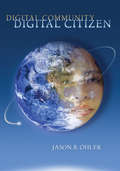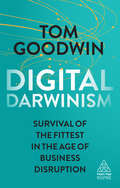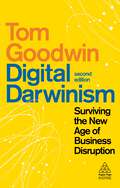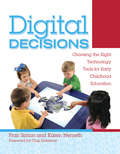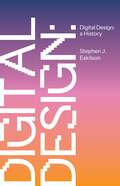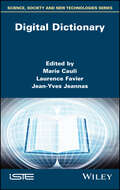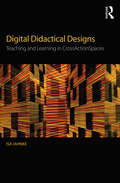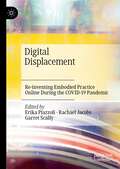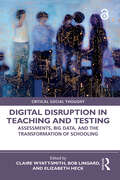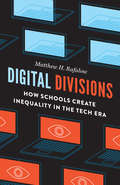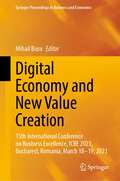- Table View
- List View
Digital Badges in Education: Trends, Issues, and Cases
by Zane L. Berge Lin Y. MuilenburgIn recent years, digital badging systems have become a credible means through which learners can establish portfolios and articulate knowledge and skills for both academic and professional settings. Digital Badges in Education provides the first comprehensive overview of this emerging tool. A digital badge is an online-based visual representation that uses detailed metadata to signify learners’ specific achievements and credentials in a variety of subjects across K-12 classrooms, higher education, and workplace learning. Focusing on learning design, assessment, and concrete cases in various contexts, this book explores the necessary components of badging systems, their functions and value, and the possible problems they face. These twenty-five chapters illustrate a range of successful applications of digital badges to address a broad spectrum of learning challenges and to help readers formulate solutions during the development of their digital badges learning projects.
Digital Camera Techniques
by Jon TarrantThe best photographs start with proper attention behind the camera before you take them. Jon Tarrant shows you how to achieve this by fully explaining how digital cameras work so you too can achieve professional-looking results without having to resort to image manipulation on a computer. Jon explains all the basics of digital cameras: their anatomy; an outline of broad classes, indicated by price bands and features offered; a comparison with existing families of film cameras as a useful guide to newcomers. He also provides an invaluable buyer's guide pointing out features to look for on a digital camera before you make your purchase.Coverage includes detail on lenses, exposure basics, 'correct' exposure, using flash, the chip and the implications of this 'restriction', image quality and retaining this quality, as well as discussion of the difficulties of digital cameras and sections on specific types of photography with digital cameras. Complete coverage is ensured with information on printing, storage and filing, the Internet as a medium of images, picture software and digital enhancement, always keeping the emphasis on the fact that the most important consideration is how you take the photographs and the vision you had then and knowing when to stop tinkering with your image!This inspirational, full colour guide is what all digital camera owners have been waiting for. Jon Tarrant shows all keen digital photographers how to improve their photography and make the most of the latest technology.
Digital Cameras and Equipment For Dummies, Pocket Edition
by Julie Adair King Serge Timacheff David D. BuschHow to choose, use, equip, and maintain your digital camera Which digital camera best suits your needs? How many megapixels do you really need? How do you store and protect your photos? Which features areessential and which are expensive frills? Find the answers for buying, using, and caring for your digital camera in this little book! Open the book and find: How to choose between point-and-shoot and SLR Money-saving shopping pointers Insight on the best photo editing software Advice on memory cards and storage Camera maintenance and emergency care tips
Digital Capture After Dark
by Amanda Quintenz-Fiedler Philipp Scholz RittermannThe pitfalls of photographing at night are many. Autofocus and built-in light meters generally fail at night. Long exposures tend to make noisy or blurry photographs. Cameras set to automatic generally trigger the built-in flash in low light conditions, which results in unsatisfying images. Lack of understanding and inappropriate techniques often ruin the dramatic potential of nighttime images. In Digital Capture After Dark you will learn to overcome these and other obstacles. You will go beyond the many "how-to's" of capturing digital images at night to the "why-to's" of long exposure photography; including the importance of how we think and see at night compared to during the day. Also discussed are hands-on image editing techniques that will help you prepare your images for output. Detailed descriptions cover color balancing, expanding dynamic range, controlling flare, dealing with noise, converting to black-and-white, toning, and much more.
Digital Carnivalesque: Power Discourse and Counter Narratives in Singapore Social Media (Cultural Studies and Transdisciplinarity in Education #10)
by Hoi-Yi Katy KanThis book challenges the framing of comedic acts as apolitical and it adopts a multimodal critical discourse approach to interrogate the performance of comedy as a form of power. It proposes using Bakhtin’s carnivalesque as the analytic tool to distil for readers key differences between humour as banal and humour as critical (and political) in today’s social media. Drawing from critical theory and cultural studies, this book takes an interdisciplinary approach in formulating a contemporary view of power that reflects social realities not only in the digital economy but also in a world that is increasingly authoritarian. With the proposition of newer theoretical lenses in this book, scholars and social scientists can then find a way to shift the conversation to uncover the evolving voices of (existing and newer) power holders in the shared digital space; and to view current social realities as a continual project in unpacking and understanding the adaptive ways of the human spirit.
Digital Childhoods: Technologies And Children's Everyday Lives (International Perspectives on Early Childhood Education and Development #22)
by Marilyn Fleer Susan J. Danby Christina Davidson Maria HatzigianniThis book highlights the multiple ways that digital technologies are being used in everyday contexts at home and school, in communities, and across diverse activities, from play to web searching, to talking to family members who are far away. The book helps readers understand the diverse practices employed as children make connections with digital technologies in their everyday experiences. In addition, the book employs a framework that helps readers easily access major themes at a glance, and also showcases the diversity of ideas and theorisations that underpin the respective chapters. In this way, each chapter stands alone in making a specific contribution and, at the same time, makes explicit its connections to the broader themes of digital technologies in children’s everyday lives. The concept of digital childhood presented here goes beyond a sociological reading of the everyday lives of children and their families, and reflects the various contexts in which children engage, such as preschools and childcare centres.
Digital Children: A Guide for Adults
by Andy Phippen Sandra Leaton GrayThe digital world is a place where even the most informed parents and teachers can feel one pace behind children. Bombarded with scare stories about the risks of everyday Internet interactions for young people, those caring for them are frequently left to navigate online minefields more or less on their own. This book is here to help. Two leading experts on digital childhoods, Dr Sandra Leaton Gray and Professor Andy Phippen, explore the realities of growing up online in the 21st century. They provide an informative and accessible guide to the issues young people face today, based on the latest research and scholarship. They also expose the many ways the child safeguarding industry means well, but often gets things very wrong. The authors explain the latest research on topics such as biometrics, encryption, cyphertext and sexting, and analyse their relevance to the next generation. They raise a number of key questions about the contemporary lives of young people, including their relationship with digital technologies such as games, social media, surveillance and tracking devices. They also challenge conventional thinking on these issues. Rather than relying on technology, they argue we should instead focus on the quality of relationships between children, their peers, their parents and with adults generally. Then we can build a healthy digital future for society as a whole.
Digital Children: A Guide for Adults
by Andy Phippen Sandra Leaton GrayThe digital world is a place where even the most informed parents and teachers can feel one pace behind children. Bombarded with scare stories about the risks of everyday Internet interactions for young people, those caring for them are frequently left to navigate online minefields more or less on their own. This book is here to help. Two leading experts on digital childhoods, Dr Sandra Leaton Gray and Professor Andy Phippen, explore the realities of growing up online in the 21st century. They provide an informative and accessible guide to the issues young people face today, based on the latest research and scholarship. They also expose the many ways the child safeguarding industry means well, but often gets things very wrong. The authors explain the latest research on topics such as biometrics, encryption, cyphertext and sexting, and analyse their relevance to the next generation. They raise a number of key questions about the contemporary lives of young people, including their relationship with digital technologies such as games, social media, surveillance and tracking devices. They also challenge conventional thinking on these issues. Rather than relying on technology, they argue we should instead focus on the quality of relationships between children, their peers, their parents and with adults generally. Then we can build a healthy digital future for society as a whole.
Digital Citizenship in China: Everyday Online Practices of Chinese Young People (Perspectives on Children and Young People #12)
by Jun FuThis book examines how emerging forms of citizenship are shaped by young people in digital spaces as way of making sense of contemporary Chinese society, forming new identities, and negotiating social and political participation. By focusing on Chinese young adults' everyday online practices, the book offers a unique treatment of the topic of young people and the Chinese Internet that navigates between the dominant focus on censorship on the one hand and protest and politicized action on the other. The book brings the focus of research from highly visible or spectacular forms of collectivity, belonging, and identification exhibited in young people's online practices to young people's everyday social and cultural engagement through new media. It brings new insights by understanding the meanings of young people's mundane and everyday online engagement for their citizenship learning, identity performance, and their formation of political subjectivity. Readers will gain insights into citizenship in China, and young people and the Chinese Internet.
Digital Citizenship in Schools: Nine Elements Students Should Know
by Mike RibbleDigital Citizenship in Schools, third Edition is an essential introduction to digital citizenship. Starting with a basic definition of the concept and an explanation of its relevance and importance, author Mike Ribble goes on to explore the nine elements of digital citizenship. He provides useful audit and professional development activities to help educators determine how to go about integrating digital citizenship concepts into the classroom. Activity ideas and lesson plans round out this timely book.
Digital Citizenship: A Community-Based Approach (Corwin Connected Educators Series)
by Susan M. BeardenMake responsible digital citizenship part of your school’s culture! Use this book’s community-based approach to building digital citizenship to teach, learn, and thrive in today’s digital environment. Expertly navigate the pitfalls of the digital world, take hold of the plethora of opportunities available to you, and confidently engage in online connections without fear! Educators, parents, and students will discover how to: Protect privacy and leave positive online footprints Understand creative credits and copyright freedoms Foster responsible digital behaviors through safe and secure practices Enlist all stakeholders to help ingrain digital citizenship into the school culture The Corwin Connected Educators series is your key to unlocking the greatest resource available to all educators: other educators. Being a Connected Educator is more than a set of actions: it’s a belief in the potential of technology to fuel lifelong learning. "Susan Bearden has written a definitive work on the most salient issue facing contemporary education." Matt Harris, Chair of the Board of Directors International Society for Technology in Education "Susan Bearden understands that students’ education requires the education of all of us: parents, administrators, community members. In clear, poignant terms she spells out what each of us needs to do to become an inspired, responsible digital citizen. This is a must read book for anyone wanting to know how to address our concerns about our online lives, while focusing on all the good that the networking world has to offer." Jason Ohler, Professor University of Alaska
Digital Citizenship: A Community-Based Approach (Corwin Connected Educators Series)
by Susan M. BeardenMake responsible digital citizenship part of your school’s culture! Use this book’s community-based approach to building digital citizenship to teach, learn, and thrive in today’s digital environment. Expertly navigate the pitfalls of the digital world, take hold of the plethora of opportunities available to you, and confidently engage in online connections without fear! Educators, parents, and students will discover how to: Protect privacy and leave positive online footprints Understand creative credits and copyright freedoms Foster responsible digital behaviors through safe and secure practices Enlist all stakeholders to help ingrain digital citizenship into the school culture The Corwin Connected Educators series is your key to unlocking the greatest resource available to all educators: other educators. Being a Connected Educator is more than a set of actions: it’s a belief in the potential of technology to fuel lifelong learning. "Susan Bearden has written a definitive work on the most salient issue facing contemporary education." Matt Harris, Chair of the Board of Directors International Society for Technology in Education "Susan Bearden understands that students’ education requires the education of all of us: parents, administrators, community members. In clear, poignant terms she spells out what each of us needs to do to become an inspired, responsible digital citizen. This is a must read book for anyone wanting to know how to address our concerns about our online lives, while focusing on all the good that the networking world has to offer." Jason Ohler, Professor University of Alaska
Digital Communication and Learning: Changes and Challenges (Educational Communications and Technology Yearbook)
by Will W. K. Ma Wendy Wing Lam Chan Anna Wing Bo Tso Alex Chi-keung Chan Peter Edward SidorkoThis edited book collects papers with perspectives from scholars and practitioners in Asia, Australia, and Europe to reveal the pros and cons, chances and challenges, constraints, and potential risks that educators and learners are facing as the new paradigm for communication and learning takes place, with a view to shedding light on the global education climate in the midst of the pandemic. Since the onset of the global pandemic, education has been revolutionized in almost every aspect. The emergency precautionary measures which were once supposed to be temporary school arrangements only have now become the new normal, reshaping our understanding of learning environments, redefining the pedagogic standards in terms of teaching practices, learning designs, teacher–student interaction, feedback, and assessment. Online teaching, distanced learning, flipped classrooms, and self-paced e-learning have all played an increasingly vital role in shaping a new education culture in various education settings, affecting school management, teachers, students, and parents alike. While ICT in education, alongside new media, has provided ample benefits and convenience for educators and students, communication and virtual lessons conducted in the socially distanced classroom appear to have brought issues such as the digital divide, e-mental health, insufficient technical support, inefficient classroom management, reduced interaction between teachers and students, not to mention the growing concerns over privacy and security.
Digital Community, Digital Citizen
by Jason B. OhlerAn all-inclusive roadmap to citizenship in the 21st Century Best-selling author, educator, and futurist Jason Ohler challenges all readers to redefine our roles as citizens in today’s globally connected infosphere. His text aligns the process of teaching digital citizenship with the ISTE standards definition, and uses an “ideal school board” device to address fears, opportunities, and the critical issues of character education. These issues include: Cyberbullying, “sexting,” and other safety concerns Students’ ability to creatively access and critically assess information Respect and ethics regarding copyrighted information Communicating appropriately in an expanded and public realm
Digital Competence in Agile and Hierarchical Organizations: Operational Performance Under Global Uncertainties (Routledge Studies in Innovation, Organizations and Technology)
by Festus AdedoyinThis book explores the critical intersection of digital competence, operational performance, and organizational agility, offering insights for academics, professionals, and decision-makers navigating the digital era. Through a global lens, it examines digital transformation strategies across diverse contexts, including higher education, multinational organizations, and cultural landscapes, with a case study of Astana IT University for one of the chapters. The book delves into the implications of cybersecurity, data analytics, and business intelligence for enhancing digital competence, comparing agile and hierarchical organizational structures. It also addresses the challenges of uncertainty, the impact of cultural factors, and the opportunities presented by remote work and digital collaboration. Readers will gain practical frameworks and comparative analyses to strengthen digital transformation initiatives and improve organizational performance.This resource is invaluable for leaders seeking to foster agility, overcome uncertainty, and leverage technology for sustainable growth. It will be of interest to academics, professionals, and policymakers across a wide range of fields, including strategic management, technology and innovation management, and organizational behaviour.
Digital Darwinism: Survival of the Fittest in the Age of Business Disruption (Kogan Page Inspire)
by Tom GoodwinDigital Darwinism takes an exhilarating look at disruptive thinking to inspire those who want to be the best at digital transformation. Change across business is accelerating, but the lifespan of companies is decreasing. Life is more unpredictable than ever and leaders are facing a growing abundance of decisions to make, data to process and technology that threatens to disrupt even the most established business models. These are the forces that could destroy your company but, with the right strategy in place, they could also help you transform it into a market leader. Digital Darwinism is a guiding hand through the turbulence of this moment, offering practical strategies as well as an ambitious call-to-action that lights a fire underneath complacency and inspires creative change. In this book, Tom Goodwin shines a light into the future by exploring technology, society and the lessons of the past so that you can understand how to adapt, what to embrace and what to ignore. Goodwin proves how every assumption the business world has previously made about "digital" is wrong in order to revolutionize your mindset: incremental change isn't good enough, adding technology at the edges won't work and digital isn't a thing - it's everything. If you want your organization to succeed in the post-digital age, you need to be enlightened by Digital Darwinism.
Digital Darwinism: Surviving the New Age of Business Disruption (Kogan Page Inspire)
by Tom GoodwinDisruption is back with a vengeance. If ever there was a time to learn how to adapt, grab opportunities and bounce back - it's now. Learn how to keep your business relevant, meet new customer expectations and leverage technology.Bestselling author and business influencer Tom Goodwin is back with this entirely revised new edition of Digital Darwinism. This book guides you through the unrelenting pace of change and uncertainty facing business leaders today. Currently in a hybrid world where digital and real-world experiences collide and are expected to seamlessly blend into one another, never has the need to be on top of your digital transformation been felt more strongly. With new expectations from customers and employees alike, how will your business grow and survive the future? Learn how to become truly customer-centric, drive digital transformation through a culture of real innovation and challenge assumptions of how things have been done before. The survival of your business depends on it.
Digital Decisions: Choosing the Right Technology Tools for Early Childhood Education
by Chip Donohue Karen Nemeth Fran Simon"Digital Decisions will open your eyes and expand your awareness of how technology fits into a purposefully planned child-centered classroom."- Paula Jorde Bloom, Michael W. Louis Endowed Chair, McCormick Center for Early Childhood Leadership "Simon and Nemeth transform the debate between technology as good or bad, rather showing us how to use technology actively and interactively within good active and interactive early childhood programs." -Ellen Galinsky, Author, Mind in the Making: The Seven Essential Life Skills Every Child Needs Feel confident and competent when it comes to choosing and implementing the most appropriate technology tools for your early childhood classroom! Whether you are a technology enthusiast looking for new ideas and guidance about developmentally appropriate practices, or you are new to the idea of using technology with young children, this book is for you.Digital Decisions provides everything you need to make your own technology plan based on your experiences and beliefs, the needs of the children, the context of your curriculum and the resources available to you. This no-nonsense, jargon-free guide will help you evaluate the tools and opportunities technology has to offer and integrate them into your early childhood classroom so you can offer real-life, hands-on, interactive activities to children. A reference every childhood program will want to have, Digital Decisions is brimming with charts, resources, and an array of activities that maximize technology as an interactive learning tool. Each chapter provides supporting guidance to make technology most effective for those working with children who are dual language learners or may have special needs.
Digital Design: A History
by Stephen EskilsonA groundbreaking history of digital design from the nineteenth century to todayDigital design has emerged as perhaps the most dynamic force in society, occupying a fluid, experimental space where product design intersects with art, film, business, engineering, theater, music, and artificial intelligence. Stephen Eskilson traces the history of digital design from its precursors in the nineteenth century to its technological and cultural ascendency today, providing a multifaceted account of a digital revolution that touches all aspects of our lives.We live in a time when silicon processors, miniaturization, and CAD-enhanced 3D design have transformed the tangible world of cars and coffee makers as well as the screen world on our phones, computers, and game systems. Eskilson provides invaluable historical perspective to help readers better understand how digital design has become such a vibrant feature of the contemporary landscape. He covers topics ranging from graphic and product design to type, web design, architecture, data visualization, and virtual reality. Along the way, he paints compelling portraits of key innovators behind this transformation, from foundational figures such as Marshall McLuhan, Nam June Paik, and April Greiman to those mapping new frontiers, such as Jeanne Gang, Jony Ive, Yugo Nakamura, Neri Oxman, and Jewel Burks Solomon.Bringing together an unprecedented array of sources on digital design, this comprehensive and richly illustrated book reveals how many of the digital practices we think of as cutting-edge actually originated in the analog age and how the history of digital design is as much about our changing relationship to forms as the forms themselves.
Digital Dictionary
by Marie Cauli Laurence Favier Jean-Yves Jeannas"Digital age", "digital society", &“digital civilization&”: many expressions are used to describe the major cultural transformation of our contemporary societies.Digital Dictionary presents the multiple facets of this phenomenon, which was born of computers and continues to permeate all human activity as it progresses at a rapid pace. In this multidisciplinary work, experts, academics and practitioners invite us to discover the digital world from various technological and societal perspectives.In this book, citizens, trainers, political leaders or association members, students and users will find a base of knowledge that will allow them to update their understanding and become stakeholders in current societal changes.
Digital Didactical Designs: Teaching and Learning in CrossActionSpaces
by Isa JahnkeAs web-enabled mobile technologies become increasingly integrated into formal learning environments, the fields of education and ICT (information and communication technology) are merging to create a new kind of classroom: CrossActionSpaces. Grounding its exploration of these co-located communication spaces in global empirical research, Digital Didactical Designs facilitates the development of teachers into collaborative designers and evaluators of technology-driven teaching and learning experiences—learning through reflective making. The Digital Didactical Design model promotes deep learning expeditions with a framework that encourages teachers and researchers to study, explore, and analyze the applied designs-in-practice. The book presents critical views of contemporary education, theories of socio-technical systems and behavior patterns, and concludes with a look into the conceptual and practical prototypes that might emerge in schools and universities in the near future.
Digital Displacement: Re-inventing Embodied Practice Online During the COVID-19 Pandemic
by Erika Piazzoli Rachael Jacobs Garret ScallyThis book conceptualises the novel notion of ‘digital displacement’: the sudden pivoting to online technology in education caused by the Covid-19 pandemic. The book documents this historical phenomenon in education and discusses the consequences for educator practice and educational strategies, in particular arts-based educators. Its content and scope cover both practice-based and academic frameworks, offering a scholarly investigation of the effect of the pandemic on embodied work, including drama, music, voice, dance and film, through a series of seven case stud-ies. The book also examines embodied online practice with a view to how COVID-19 has changed this in the long term.
Digital Disruption in Teaching and Testing: Assessments, Big Data, and the Transformation of Schooling (Critical Social Thought)
by Claire Wyatt-SmithThis book provides a significant contribution to the increasing conversation concerning the place of big data in education. Offering a multidisciplinary approach with a diversity of perspectives from international scholars and industry experts, chapter authors engage in both research- and industry-informed discussions and analyses on the place of big data in education, particularly as it pertains to large-scale and ongoing assessment practices moving into the digital space. This volume offers an innovative, practical, and international view of the future of current opportunities and challenges in education and the place of assessment in this context.
Digital Divisions: How Schools Create Inequality in the Tech Era
by Matthew H. RafalowIn the digital age, schools are a central part of a nationwide effort to make access to technology more equitable, so that all young people, regardless of identity or background, have the opportunity to engage with the technologies that are essential to modern life. Most students, however, come to school with digital knowledge they’ve already acquired from the range of activities they participate in with peers online. Yet, teachers, as Matthew H. Rafalow reveals in Digital Divisions, interpret these technological skills very differently based on the race and class of their student body. While teachers praise affluent White students for being “innovative” when they bring preexisting and sometimes disruptive tech skills into their classrooms, less affluent students of color do not receive such recognition for the same behavior. Digital skills exhibited by middle class, Asian American students render them “hackers,” while the creative digital skills of working-class, Latinx students are either ignored or earn them labels troublemakers. Rafalow finds in his study of three California middle schools that students of all backgrounds use digital technology with sophistication and creativity, but only the teachers in the school serving predominantly White, affluent students help translate the digital skills students develop through their digital play into educational capital. Digital Divisions provides an in-depth look at how teachers operate as gatekeepers for students’ potential, reacting differently according to the race and class of their student body. As a result, Rafalow shows us that the digital divide is much more than a matter of access: it’s about how schools perceive the value of digital technology and then use them day-to-day.
Digital Economy and New Value Creation: 15th International Conference on Business Excellence, ICBE 2021, Bucharest, Romania, March 18–19, 2021 (Springer Proceedings in Business and Economics)
by Mihail BusuThis book constitutes a selection of the best papers from the 15th International Conference on Business Excellence, Digital Economy and New Value Creation, ICBE 2021, held in Bucharest, Romania, in March 2021.This book is a collection of research findings and perspectives related to the digital economy and new value creation, led by the set of improvements and changes in the economic, societal and technological structures and processes towards the effort of reaching the sustainability goals.
